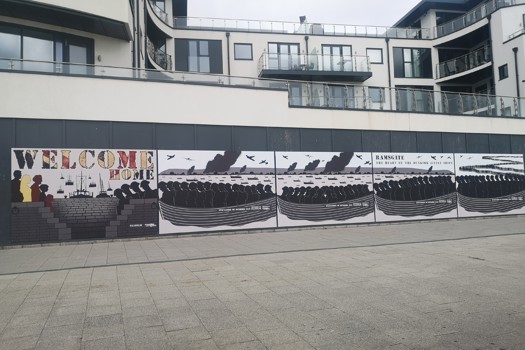Jade Jones' victory against world champion Yuzhuo Hou in last night's Taekwondo final not only made her Britain's first Olympic gold medallist in the sport, but also the face of the 25th special edition Gold Medal stamp.
Like all of the 24 preceeding Gold Medal Stamps, Jones' will be in 500 Post Office branches by lunchtime today, regardless of the fact that her bout didn't finish until 10:30pm the night before.
Within minutes of her victory being confirmed, Royal Mail's team of designers would have received a selection of action shots from Jones' fight from the London 2012 official photo agency, Getty Images.
From that moment the team had approximately one hour to produce the design and get it through the various stages of approval, including a final check with LOCOG, before getting it to the printers.
Last night's victory for Jones was the latest of all Team GB's wins thus far, coming in the penultimate final of the day; however, Royal Mail's head of production for Stamps and Collectibles Martyn Fry told PrintWeek yesterday afternoon that after "Super Saturday", which marked GB's most successful one-day medal haul in 104 years with six golds, he was confident his team could cope with anything.
"The normal lead time for a special is 18 months," he said. "We're collapsing that into 12-24 hours and to produce six in one day and have them all printed and distributed without any problems really shows how much planning went into this.
"Before the Olympics Royal Mail had never issued stamps on a Sunday before let alone issued six in one day, so it has been a record-breaking achievement in many ways. We tried to pin down as much as we could beforehand to make sure things would run smoothly and we're just delighted with the way it's all worked."
Once the designs for each of the Gold Medal stamps have been signed off, they are sent via secure FTP to Royal Mail's six secret print partners, which were chosen to ensure a good geographical spread around the country.
Contrary to most stamps, which are gravure printed, the Gold Medal stamps have all been printed using B2 sheetfed litho presses on pre-printed base stock. "Because of the nature of stamps, with things like the security elements, we had to make sure we could control production quite tightly," said Fry.
"So we used pre-printed base sheets that contained everything except the image and text of the winning athlete and these were then overprinted in four-colour process with a spot sealer. The metallics and special colours were all on the base sheets."
Of course, this presented its own logistical balancing act in terms of judging how many base sheets to get printed to ensure there were sufficient for any medal tally, without ending up with a lot of waste sheets at the end either.
"We went through various scenarios based on the predictions of various pundits, as well as LOCOG's own estimates. The range we ended up with was between 15-30 stamps and we obviously went to the higher end of that forecast because we didn't want to have to reprint the base sheets," said Fry.
Another key issue was ensuring consistency across the six print sites. In addition to having Royal Mail staff on-site at the six locations, Fry said that the monitors at each of the sites had been calibrated to make sure that everyone in the supply chain was viewing the same thing.
This negated the need for physical proofs and instead proofing was done via the FTP site, with each printer uploading the ripped file for final approval prior to going to press.
The printed stamps were then delivered from the six print sites by a fleet of more than 100 Royal Mail same day couriers to the 500 Post Office branches that were chosen to have the stamps available on a next day basis.
Each printer was responsible for printing stamps for up to 90 different delivery routes, with the individual sites' print run varying depending on the size of its routes.
According to Fry, while there have certainly been a few late nights, the whole process has run like clockwork and even on Super Saturday, when three of the six gold medals were won in the evening session, it was simply a case of staggering the flow of artwork to the printers to avoid trying to do too much at once.
All of which does place a question mark over the British Paralympic Association's statement on its website that it would be "logistically and practically impossible to produce an individual stamp for every one of the gold medallists for ParalympicsGB".
This statement was issued in response to an online outcry over the fact Paralympic gold medallists would not grace their own individual stamp in the same manner as their Olympic colleagues, but would rather appear across a series of six stamps to be released after the Games.
Fry would not be drawn on the subject other than to say that Royal Mail was happy with the plans it had agreed with the BPA, which cited the fact that at the Beijing Olympics, ParalympicsGB had won 42 gold medals over 10 days, including nine in one day, as evidence of the "impossible" task it would be to create individual stamps for each of the gold medallists.
In addition to the six post-Games specials, each ParalympicGB gold medal winner will have a post box in their home town painted gold while Royal Mail has set up a £200,000 prize fund to be divided equally between all gold medallists.
Tweet









